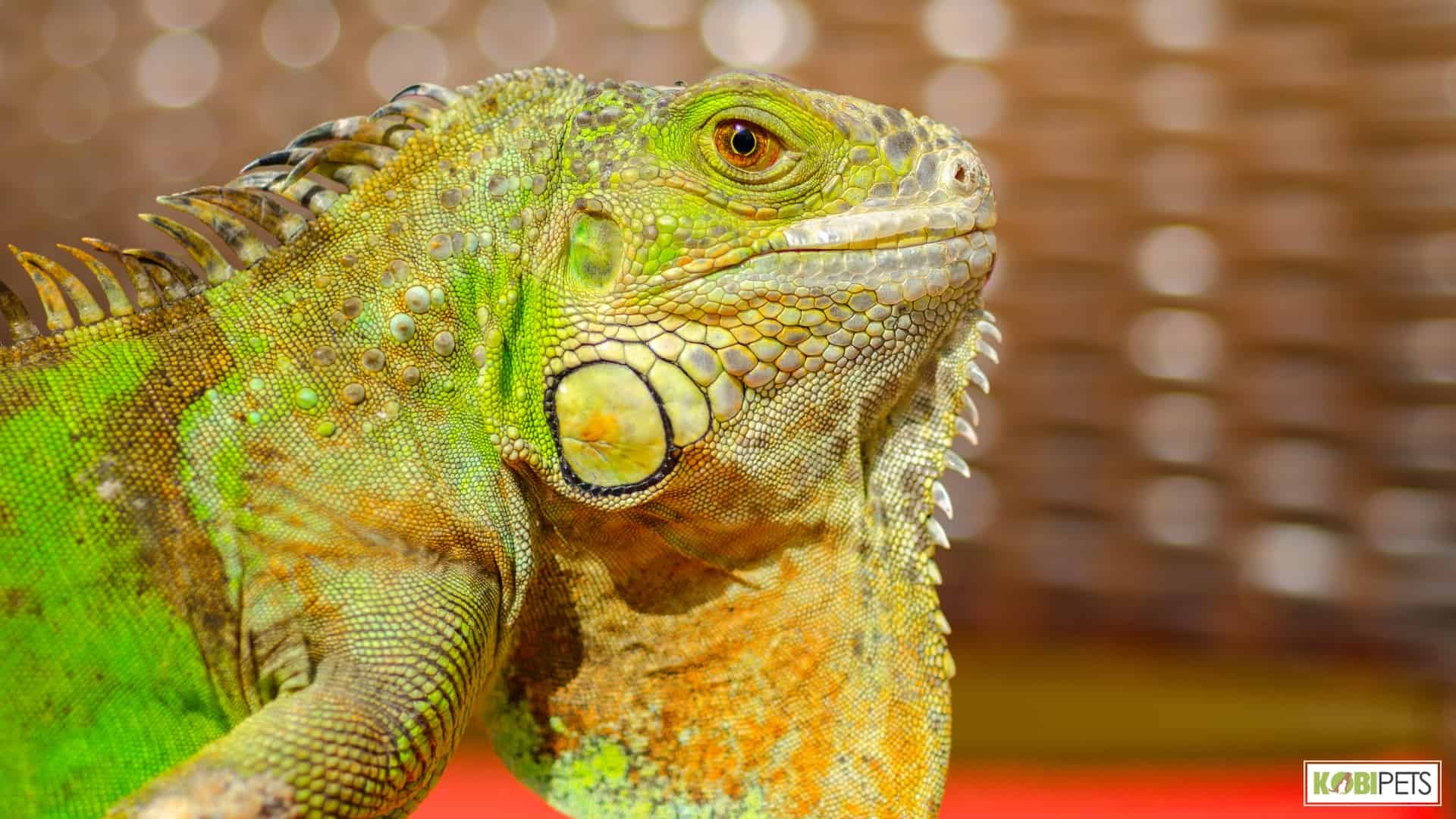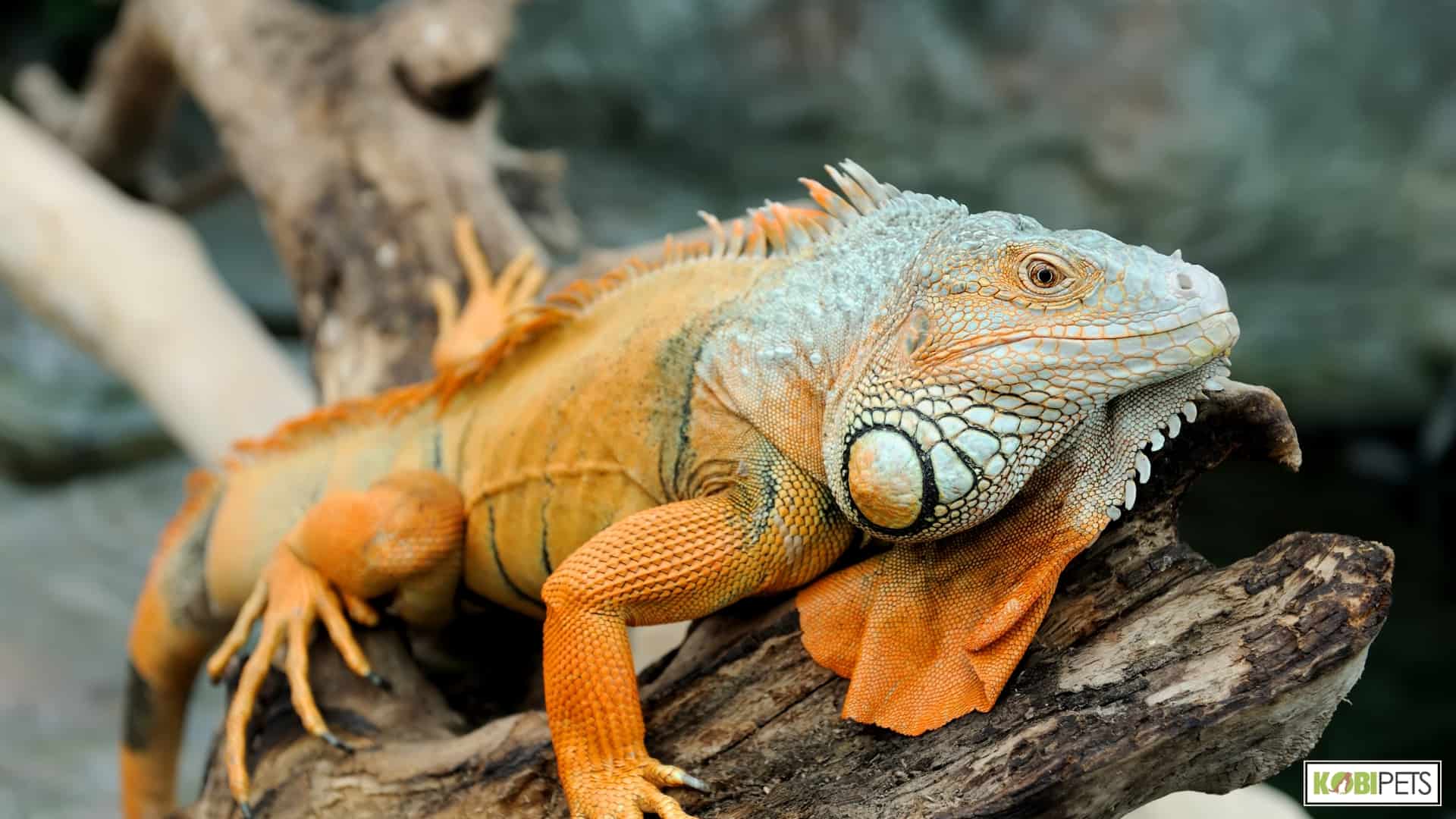
Deciding whether an exotic pet is right for you is a serious decision and requires research and consideration of factors such as legal requirements, housing and space needs, diet, veterinary care, and the level of commitment and cost involved.
It’s important to research the specific species you are considering and talk to current exotic pet owners before making a decision. Remember that exotic pets are living beings and require a significant commitment, so make sure you are able to provide the necessary care and resources before bringing one into your home.
What Are Exotic Pets?
Exotic pets are animals kept as companions that originate from a non-native or unusual species. This includes creatures like snakes, lizards, birds, small mammals, and even fish. While some of these pets may not be available in traditional pet stores, they’re easily obtained online or through hobbyists and breeders.
Exotic pets differ from typical household pets such as cats and dogs due to their nature and lifespan. They often require specialized care and diet to live a long life so potential owners need to be prepared prior to adoption. Those that provide the necessary care will find these unique creatures fascinating and enjoyable companions.

What Are Exotic Pets?
Reasons Why People Choose to Own Exotic Pets
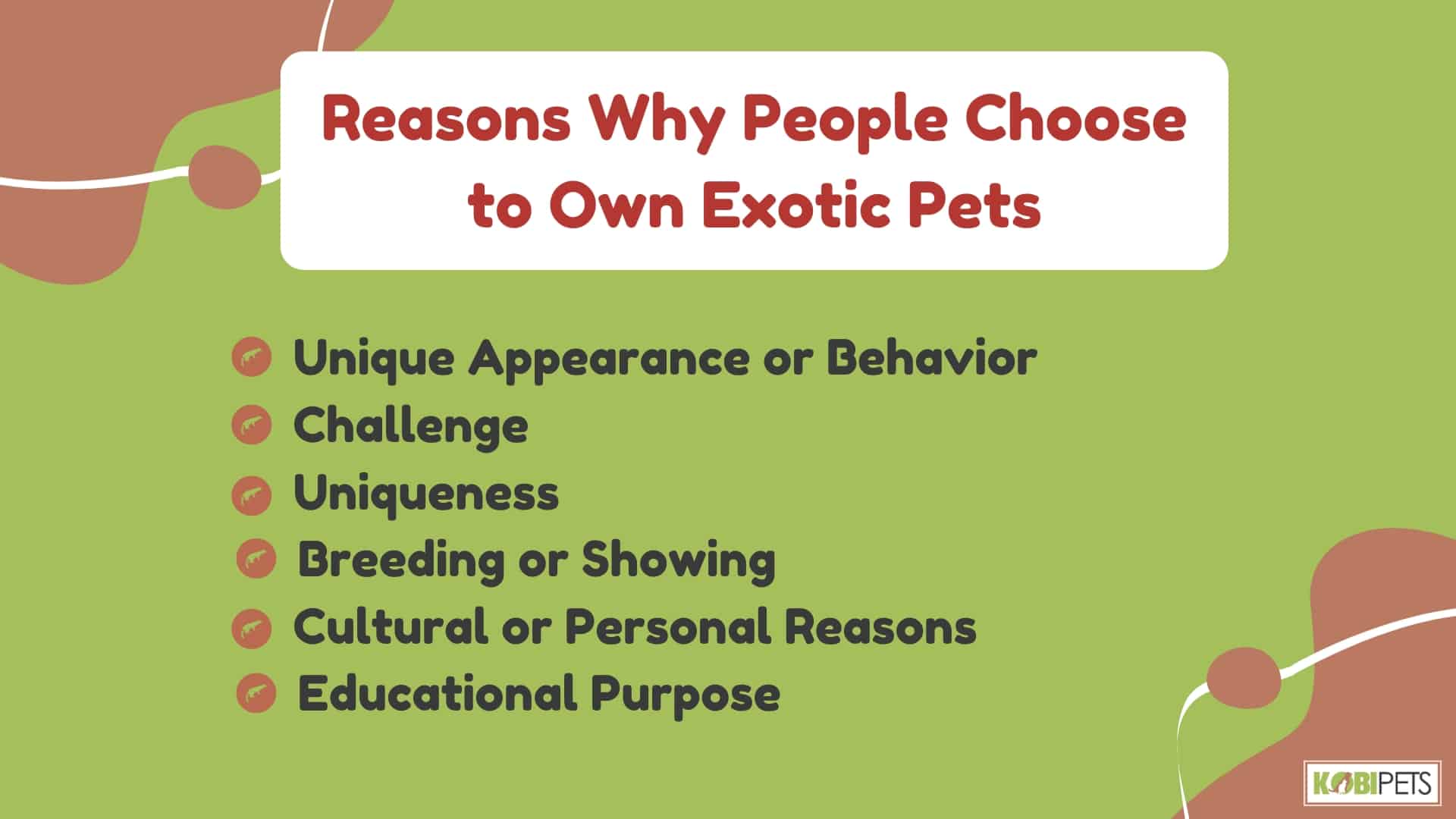
Reasons Why People Choose to Own Exotic Pets
Unique Appearance or Behavior
Some people may be drawn to the unique characteristics of certain exotic species, such as their color, pattern, size, or behavior. For example, owning a brightly colored parrot or a snake with a unique pattern can be appealing to some people.
Challenge
Some people may enjoy the challenge of caring for a species that has specific and demanding needs. For example, owning a reptile that requires specific temperatures and lighting can be challenging, but also rewarding for some people.
Uniqueness
Some people may be attracted to the idea of owning a pet that is not commonly found in households, and they find it interesting to own something different. This might be one of the reasons why some people might choose an exotic pet over a more common domestic pet.
Breeding or Showing
Some people may be interested in breeding or showing exotic pets. They may enjoy the process of breeding and raising specific species and even participate in shows to showcase their pets.
Cultural or Personal Reasons
Some people might have an interest in owning certain species because of cultural or personal reasons. For example, certain species may hold religious or cultural significance, or some people might have a personal connection to a specific species.
Educational Purpose
Some people might own exotic pets as a means of educating themselves or others about different species, and the role they play in their ecosystem.
Factors to Consider
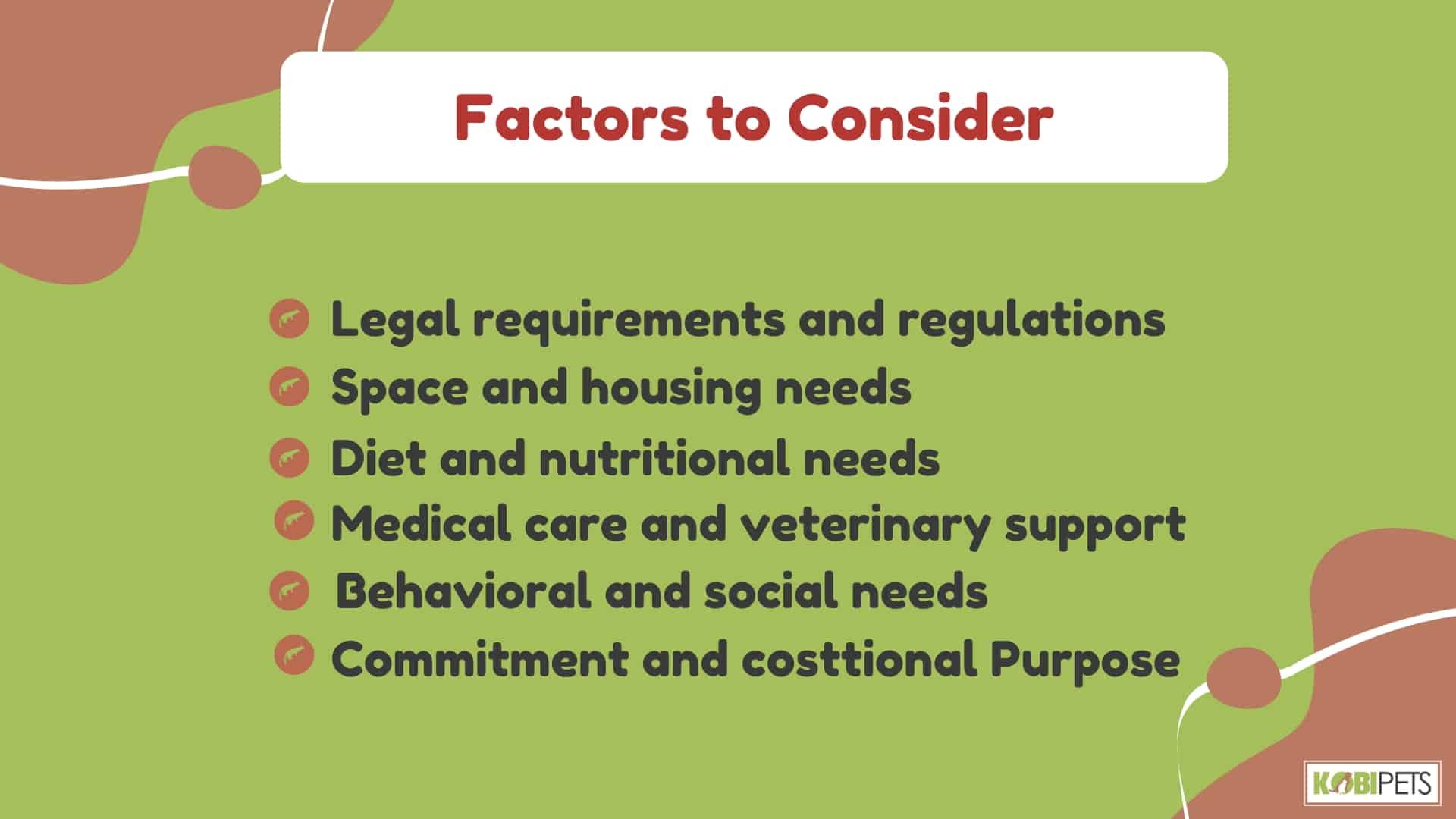
Factors to Consider
Legal requirements and regulations
Exotic pets can be a great addition to your family, but it is important to realize that they come with unique legal requirements and regulations. Before you decide if an exotic pet is right for you, research the local laws where you live; some areas may have a ban or permit requirements that restrict which animals are allowed as pets in your area.
Additionally, find out about any restrictions pertaining to housing and feeding for the animal, as well as any requirements for certifications and licenses. Finally, consider your lifestyle before getting a new pet; you will need to commit time and energy to provide adequate care for them.
Ultimately, by doing the required research beforehand, you can help make sure both you and the animal meet all legal requirements while ensuring it has the best possible living environment.
Space and housing needs
Exotic pets can add a lot of joy and entertainment for pet owners, but they also require more consideration than your typical cat or dog. Beyond the common variables such as financial stability and general care needs, there are some special things to consider when thinking of adding an exotic pet to the family.
Space is one of the most important factors to consider; different species have significantly different space requirements so it’s important to make sure that you can provide an adequate amount of space with safe enclosures in which they can move around.
In addition to that, part of owning an exotic pet includes making sure you can provide proper housing; if you want an animal who will live indoors you need to find out what kind of environment is appropriate for them, including its temperature and humidity preferences.
If the animal lives outdoors, then it is important to know what sort of shelter and heating/cooling methods are necessary. Researching each type before you decide on getting a pet could save you from disappointment in the future.
Diet and nutritional needs
Deciding whether an exotic pet is right for you should definitely involve taking into account its dietary and nutritional needs. Many exotic pets require specialized diets due to their unique evolutionary origin and physiology, so it’s important to have a good understanding of what your potential pet requires in terms of sustenance.
That said, the nutritional needs of some exotic pets can be difficult to fulfill without proper resources- from specially formulated feed mixes to specific fruits and vegetables. Before committing to any kind of pet, be sure that you are willing, able, and knowledgeable about meeting their dietary needs for the entirety of their life.
Medical care and veterinary support
When attempting to decide whether an exotic pet is a right choice for you, it is pivotal to consider both the medical care and veterinary support available for that particular type of pet.
Research must be done to ensure that you select a pet with all the necessary resources available, as certain animals may require specialized medical treatments. Consider locating veterinarians and other caregivers who can provide your desired pet with ample attention and support.
Additionally, purchasing proper insurance or creating a prevention plan can help protect against any costlier issues down the line. Ultimately, examining both medical care and veterinary support when looking into an exotic pet is essential to prevent any costly surprises later on.
Behavioral and social needs
Owning an exotic pet can be a rewarding experience for many people. However, it is important to understand that such pets have different and often specific needs, both behaviorally and socially.
For example, some animals require social interaction with their owners or other animals, while some may do better living alone. Additionally, you should consider what type of environment they should live in and which activities are best suited for them – some need regular exercise while others may prefer more stimulation or a routine they can become accustomed to.
By understanding the variety of needs associated with an exotic pet and making sure you are able to provide them, you can decide if getting one will be beneficial or too much responsibility.
Commitment and cost
When considering whether to get an exotic pet, you must consider the commitment and cost. An exotic pet can make a great companion if you are ready and willing to devote the necessary time, attention, money, and energy that they require.
Owning an exotic pet often involves a large financial investment which includes purchasing initial items such as supplies, medical needs, and more. Additionally, exotic pets normally have specialized diets and special care needs which can be very costly.
For example, certain lizards consume insects weekly that may not be easily attainable in large amounts or affordable from reputable sources. Furthermore, due to their unique needs, exotics may require veterinarian visits more often than other more common types of pets.
While some may argue that these costs are worth it for these unique companions, it is essential for potential owners to weigh all of these factors before making a decision.
Researching the Specific Exotic Pet
Researching the specific species
When considering getting an exotic pet, doing your research is key. Whether it’s researching the care and needs of the species or any local laws on ownership, a proper understanding of the animal you intend to welcome into your home is essential prior to signing any adoption papers.
While there will be many factors involved in making a decision about which type of pet is right for you, having an adequate knowledge base about the specific species will help ensure that both you and the animal are kept safe and happy in your life together.
Finding a reputable breeder or seller
When considering an exotic pet, the most important step is to find a reputable breeder or seller. Research their background and look for reviews from fellow customers to ensure that you’re in competent hands.
Ask questions such as how they source the animal, whether are there any special needs for dietary or housing requirements, and what veterinary care the animal has access to. Furthermore, inquire about the cost of ongoing supplies, like food and bedding, as these can add up quickly if not taken into account.
Make sure you know exactly what will be expected of you and remember that all exotic animals require specialized care to help them remain healthy and happy in their new home environment.
Talking to current exotic pet owners
If you’re considering getting an exotic pet, consider having a chat with someone who already has one. Exotic pet owners can provide invaluable advice based on the practical aspects of their experiences.
They know the amount of time and dedication that goes into caring for their pets, as well as how much money it takes to provide adequate nutrition, shelter, and care. Speaking with a current exotic pet owner can help you to determine whether such an endeavor is right for you in terms of cost, commitment, and lifestyle.
Through talking with experienced owners, you’ll also get insights into ways to make sure your home accommodates your future pet’s needs so that both of you are happy living together!
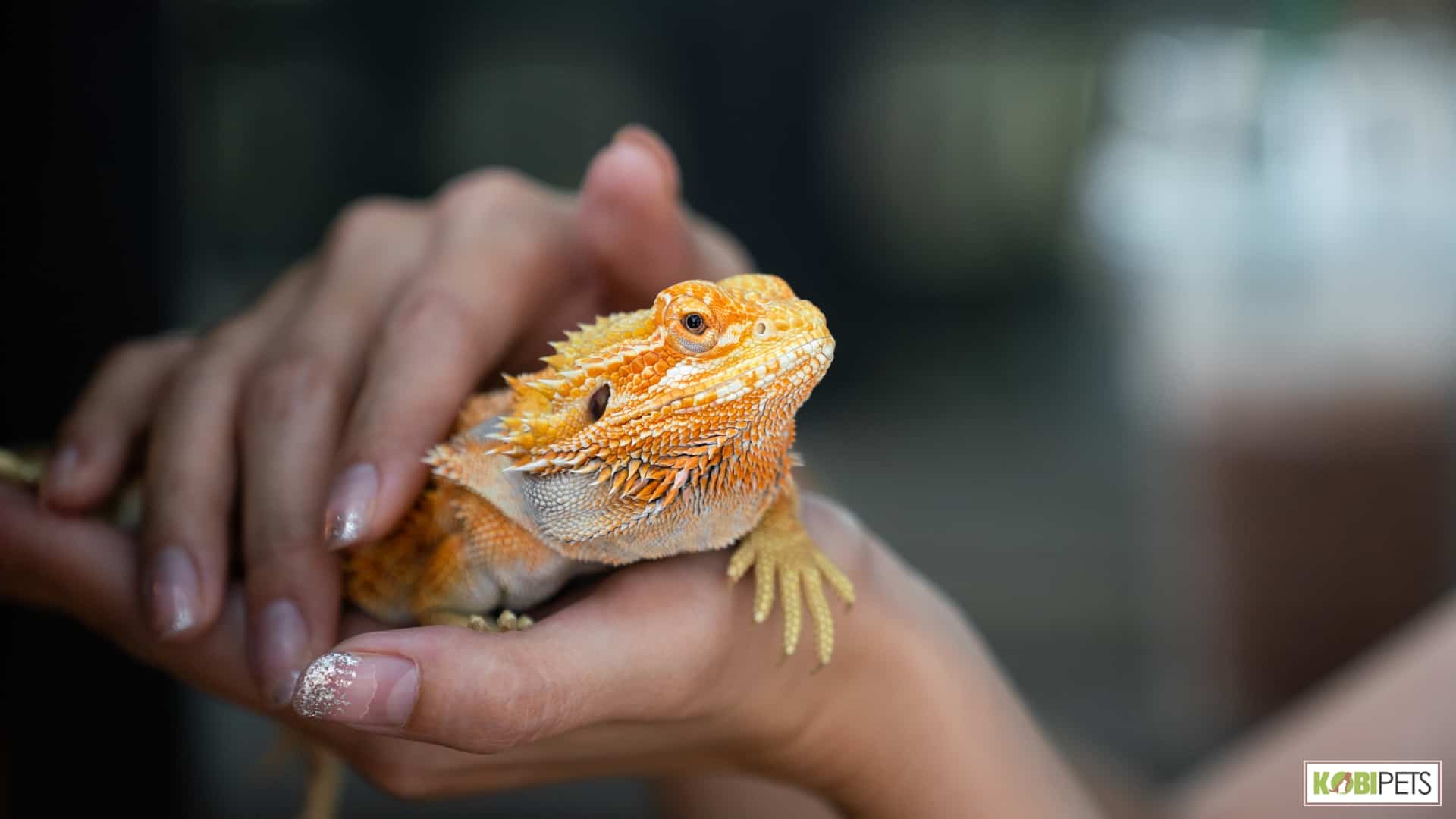
In Conclusion
When deciding whether an exotic pet is right for you, there are several factors to consider. These include the animal’s habitat, diet and exercise needs, whether it can live comfortably in your home environment, and if you have enough time and resources needed to properly care for it.
It’s also important to research local laws concerning owning exotic pets. Finally, take into account how you feel about the animal and its potential for a long-term commitment. Taking all of these factors into account will help you determine if an exotic pet is the right choice for you.
